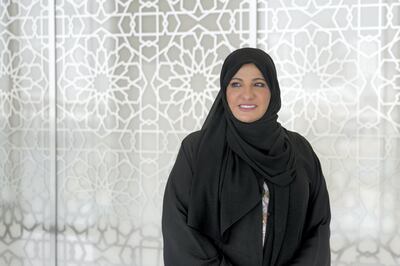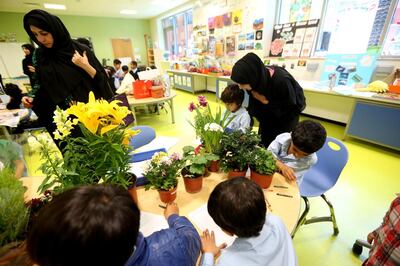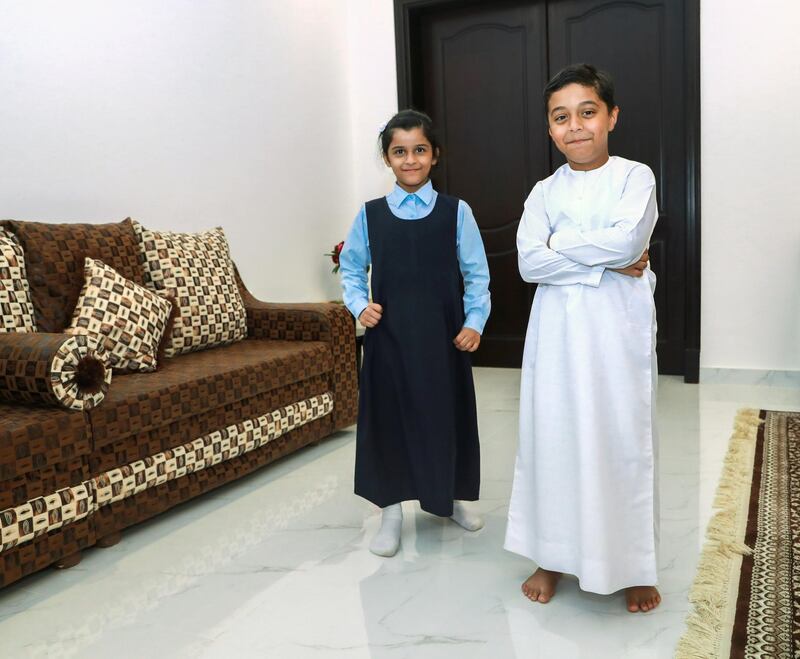Mixing boys and girls in government schools for the first time will help to curb bad behaviour in classrooms, a senior education official said.
Male and female pupils in Grade 1 will be sit side by side in class as of this week – a significant shift in the public education system.
The move proved controversial with some parents but officials believe it will improve the classroom atmosphere and reduce laddish behaviour.
In May, Minister of Education Hussain Al Hammadi said a trend in which boys filmed trouble in classrooms was unacceptable and that it was “essential to educate pupils on the positive and negative impact of the use of social media”.
All public schools in the country are now teaching boys and girls together in Grade 1 (pupils aged five to six) in a major shift in policy by the Ministry of Education.
The new strategy will be gradually introduced in the coming years, to include Grade 2 next year, continuing until mixed classes are in operation up to and including Grade 4.

Dr Ameena Al Majed, the cluster lead for Abu Dhabi schools at the Ministry of Education, told The National that mixed classes are “good for the future” of the country.
She admitted that winning over parents used to boys and girls being segregated in the class is a challenge but believes the genders will study together like “brothers and sisters”.
“The challenge is the parents. For now, it’s a big challenge. This is new for most of them,” Dr Al Majed said.
“This change will have a good impact in the future. This will be good for the future for pupils to go into the world.
“Having mixed gender classes is not a problem and there shouldn’t be a problem from families,” she said.
“Boys’ behaviour is better when the classes are mixed. They are often badly behaved, but being around the girls will help them to behave better.”
While it is common for private schools in the UAE to have mixed classrooms, it is a new scenario for many public schools. Government-run universities, such as Zayed University, have gradually accepted male students, starting in 2010, while there have been trials of mixed classes in government schools in recent years and ahead of the nationwide change this week.
But it is not viewed as a positive move by some parents.
Hind Al Naqbi, 33, an Emirati mother from Abu Dhabi, said her daughter Mira came back scared of the boys in her class on her first day in Grade 1 at Al Dana School in Mohammed bin Zayed City.
“My daughter is the biggest proof that mixing is wrong. She came back scared because two boys were hitting each other, and one of the boys was taken to hospital,” Mrs Al Naqbi said.
She said boys and girls should not be together at a young age.
“First of all, the girls will suffer from the boys’ aggressiveness. Second, some girls hit puberty early in fourth grade, and girls at that time will be very shy and they might be traumatised if the boys make fun of them.”
She said her daughter, who used to be very lively and sociable, suffered from being around boys in her kindergarten class. They used to ridicule her every time she spoke.

“They would laugh at her all the time, she then became very shy and quiet, and refused to answer the teacher in class. Moreover, boys and girls at this age have access to indecent content on the internet, and they will copy anything they see,” she said.
Mrs Al Naqbi and other mothers complained and sent a signed petition to the Abu Dhabi Education Council last year after the decision was made.
“We met the general director, but she told us this decision has been issued by the authorities and cannot be reversed.”
Mrs Al Naqbi also spoke to Al Dhibyaneya school’s principal last year, where her daughter used to study in kindergarten.
“She kept saying this step is for the future, and it is based on studies and research.”
The goal, she was told, is to end the practice of many local women who avoid certain fields because they would be working in a mixed environment.
“They want them to get used to mixing with males at an early age, but when they are young they don’t know right from wrong. When they mix later on in life it is different because they are adults and are aware of how to behave,” she said.
_______________
Read more:
Boys and girls to be educated together in major shift for UAE's public schools
Mixed feelings over mixed school as trial places boys and girls in class together
_______________
One Emirati mother, with two daughters in grades 4 and 6 at an Abu Dhabi school who asked for her name not to be used, believes boys may have a bad influence on girls in class.
“Boys and girls studying together is not a good thing,” she said. “Some boys say bad words and are bad behaved. Boys are different from girls in the way they behave. If the classes are mixed, the girls may also start behaving badly.”
Fatma Al Bannai, 29, an Emirati mother of two living in Dubai, has a four-year-old daughter and a one-year-old son and has no issue with mixed classes, but does not feel the plan should be extended beyond Grade 5.
“I went to private schools where this system is followed and I was in a mixed class until Grade 4. I don’t see a benefit or a harm in having co-educational classes because children are innocent at that age,” she said.
“I wouldn’t like if they go beyond Grade 5 because that’s when children start to mature and it would be culturally inappropriate,” Ms Al Bannai said.
Speaking about the change, the mother said: “I think parents would be upset, especially if both parents have studied in segregated classes.
“I wouldn’t blame a mother who has never had a mixed class, because it’s new to her.”
Ms Al Bannai believes even parents who agree with the idea would not be happy with mixed classes beyond Grade 4.
There are few studies that have quantified whether mixed classes lead to better behaved pupils. Most research has focused on what system produces more university students.
In 2015, Tony Little, then the headmaster of the prestigious UK boarding school Eton, and now a senior official at Gems Education, said that single-sex education allows pupils to “be themselves” until later in life and “keep their innocence”.
Keeping boys and girls apart until later “removed some of the pressures” on young people, he said.






